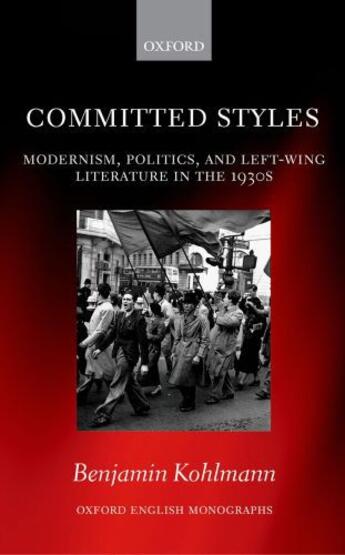-
Nombre de pages : (-)
-
Collection :
(-)
-
Genre :
(-)
-
Thème :
Non attribué
-
Prix littéraire(s) :
(-)
Résumé:
Committed Styles offers a new understanding of the politicized literature of the 1930s and its relationship to modernism. It reclaims a central body of literary and critical works for modernist studies, offering in-depth readings of texts by T.S. Eliot and I.A. Richards, as well as by key... Voir plus
Committed Styles offers a new understanding of the politicized literature of the 1930s and its relationship to modernism. It reclaims a central body of literary and critical works for modernist studies, offering in-depth readings of texts by T.S. Eliot and I.A. Richards, as well as by key left-wing authors including William Empson, David Gascoyne, Charles Madge, Humphrey Jennings, and Edward Upward. Building on substantial new archival research, Benjamin Kohlmann explores the deep tensions between modernist experimentation and political vision that lie at the heart of these works.
Taking as its focus the work of these writers, the book argues that the close interactions between literary production, critical reflection, and political activism in the decade shaped the influential view of modernism as fundamentally apolitical. Intervening in debates about the long life of modernism, it contends that we need to take seriously the anti-modernist impulse of 1930s left-wing literature even when attention is paid to the formal complexity of these 'committed' works. The tonal ambiguities which run through the politicised literature of the 1930s thus effect not a disengagement from but a more thorough immersion in the profoundly conflicted political commitments of the decade. At the same time, the study shows that debates about the politics of writing in the 1930s continue to inform current debates about the relationship between literature and political commitment.
Donner votre avis








